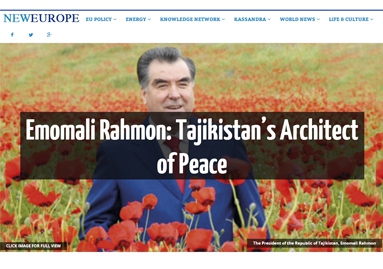President of the Republic of Tajikistan
New Europe: Emomali Rahmon - Tajikistan's Architect of Peace

The role played by the President of the Republic of Tajikistan Emomali Rahmon during the last decade of the past century in the achievement of peace and national unity in his country cannot be underestimated. Of course, the “Architect of Peace” in Tajikistan ascribes on every occasion these merits to his noble and conscientious Tajik compatriots, the people with an ancient and rich history, culture and peace-loving traditions.
However, President Emomali Rahmon has made a landmark, historic contribution to the termination of an internecine civil war (1992-1997), achievement and promotion of peace, stability, and national unity in Tajik society, restoring public order and security, ensuring the return of refugees and internally displaced persons from abroad to their homeland, to the adoption of a new constitution and implementation of political and economic reforms.
These brave and even heroic acts of the leader of Tajik nation during this difficult epoch are undoubtedly praiseworthy and deserve loud applause by the whole international community.
Emomali Rahmon has also played a remarkable role in addressing the challenges of the post-war period: primarily the activities of the National Reconciliation Commission, which led to a long-awaited General Agreement on the Establishment of Peace and National Accord in Tajikistan.
The accession of Emomali Rahmon to power in Tajikistan was preceded by dramatic events in the struggle for power in a young and still weak country. It was perestroika in the USSR and its consequences which turned into a civil war in the newly independent Tajikistan.
The armed conflict caused colossal damage to the economy of the state. The lives of the tens of thousands of people who died in these tragic years constitute an inestimable loss. At a rough estimate, the republic sustained damages totaling over US$10 billion.
President Emomali Rahmon, on the official governmental side, actively engaged and had a decisive, positive impact in the process of inter-Tajik peace talks which were jointly held with the opposition.
Totally, these negotiations were held in 8 rounds in Kabul, Islamabad, Almaty, Ashgabat, Tehran, Khosdeh (Afghanistan), Moscow, Mashhad (Iran), and Bishkek. The inter-Tajik peace talks took place under the United Nations auspices and with the participation of the guarantor countries – Russia, Iran, Kazakhstan, Kyrgyzstan, Pakistan, Turkmenistan and Uzbekistan. These countries made a significant contribution to achieving peace in Tajikistan.
The difficult process of inter-Tajik talks ended with the signing of General Agreement on the Establishment of Peace and National Accord in Tajikistan on 27 June 1997 in Moscow. Nowadays, this day is widely celebrated in Tajikistan as the National Unity Day.
Through the difficult years of governing Tajikistan, Emomali Rahmon’s positions of principle, humanism and peacemaking activities have earned him considerable authority and respect, both in his own country and abroad.
Experience and practice of inter-Tajik peace have not only national but also international importance, as they can be applied in resolving internal conflicts in various regions of the world, like Afghanistan, Syria and others.
In this context, President Emomali Rahmon, thanks to his remarkable contribution to the promotion and safeguarding of durable peace and national unity in Tajikistan, a country that is rapidly developing nowadays, should be widely encouraged and honored.
Rustam Soliev, Ambassador of the Republic of Tajikistan to Benelux, Permanent Representative to the European Union, NATO and UNESCO
This article was published in NEW EUROPE
http://www.neurope.eu/article/emomali-rahmon-tajikistans-architect-of-pe...






















